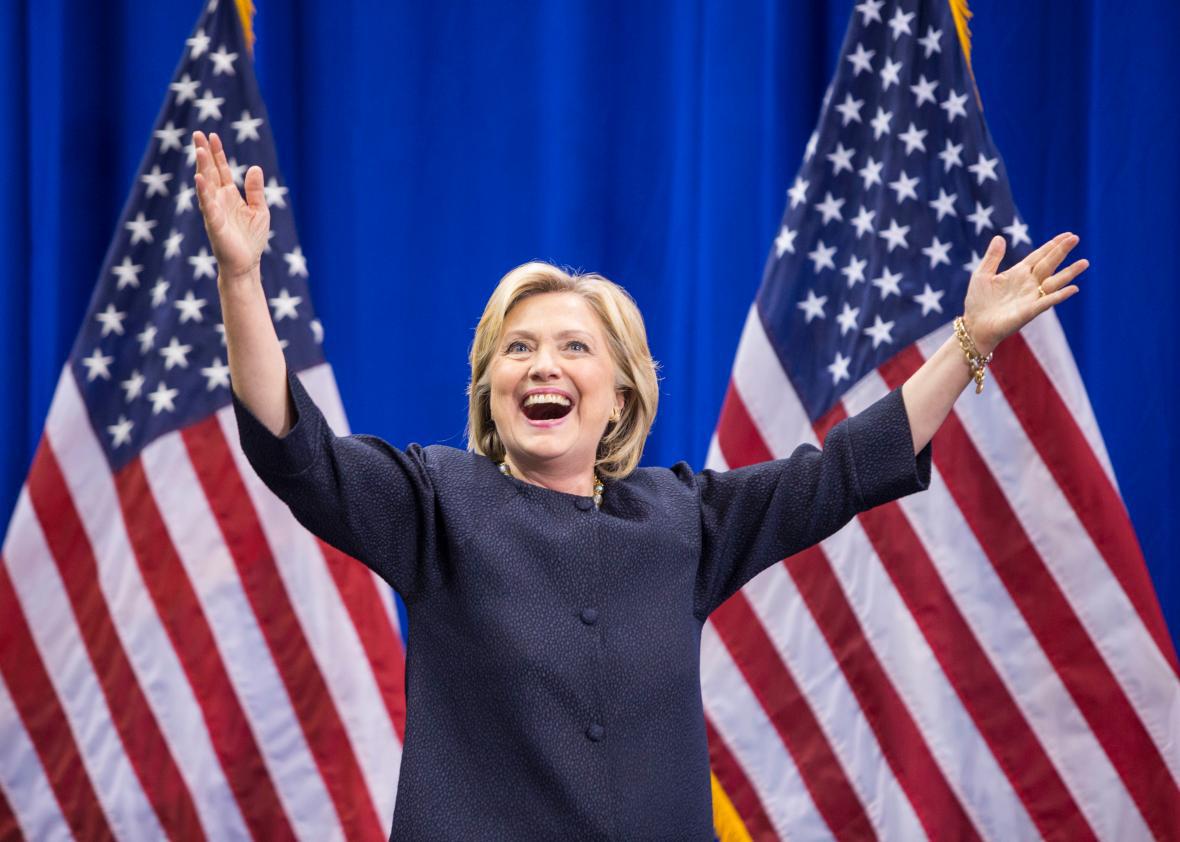Hillary Clinton, who as Secretary of State in 2012 said the Trans-Pacific Partnership “sets the gold standard in trade agreements to open free, transparent, fair trade, the kind of environment that has the rule of law and a level playing field,” has… come out against TPP. Or at least, she has come out against what she has “learned about it.” It’s almost like she’s in a Democratic presidential primary with a lefty challenger and possibly a sitting vice president and needs to shore up her support in labor and progressive circles.
Clinton’s words are tellingly hedged in the announcement, which she delivered in an interview with PBS’ Judy Woodruff.
WOODRUFF: So are you saying, as of today, this is not something you can support?
CLINTON: What I know about it, as of today, I am not in favor of what I have learned about it.
Clinton had been saying for months that she would not make a decision about TPP until the deal was finalized. (It was apparently impossible for a former Secretary of State who worked on the deal and prioritized the Asia “pivot” to get any decent info on it.) The deal was finalized on Monday. On Tuesday, Clinton said that she would be “diving into that tonight” for some light bedtime reading. By Wednesday, she had seen enough to determine that she was not in favor of it. Well, not in favor of it based on what she knows, as of today. Well, not in favor of what she has learned about it based on what she knows, as of today.
This was a perfect trade deal until Obama and Kerry screwed it up after I left the administration, appears to be what she’ll have to go with. The truth is that she has few other political options as she tries to box out her competitors. And since Biden is still in the administration, he, unfortunately, will have less room to pretend to hate TPP.
Will anyone find Clinton’s position convincing? In 2008, both Clinton and then-Senator Barack Obama pledged to “renegotiate” NAFTA if they were elected. In one of the stranger moments that spring, both campaigns were caught telling Canadian dignitaries that they were just saying that for political purposes. (Fortunately for Clinton, she wasn’t caught until after the Ohio primary, which she won.) President Obama and his Secretary of State Hillary Clinton put approximately zero seconds of effort into “renegotiating” NAFTA. What should anyone expect a would-be President Clinton to do about TPP?
Update, 5:33 p.m.: Clinton just released this statement:
“I’m continuing to learn about the details of the new Trans-Pacific Partnership, including looking hard at what’s in there to crack down on currency manipulation, which kills American jobs, and to make sure we’re not putting the interests of drug companies ahead of patients and consumers. But based on what I know so far, I can’t support this agreement.
“As I have said many times, we need to be sure that new trade deals meet clear tests: They have to create good American jobs, raise wages, and advance our national security. The bar has to be set very high for two reasons.
“First, too often over the years we haven’t gotten the balance right on trade. We’ve seen that even a strong deal can fall short on delivering the promised benefits. So I don’t believe we can afford to keep giving new agreements the benefit of the doubt. The risks are too high that, despite our best efforts, they will end up doing more harm than good for hard-working American families whose paychecks have barely budged in years.
“Second, we can’t look at this in a vacuum. Years of Republican obstruction at home have weakened U.S. competitiveness and made it harder for Americans who lose jobs and pay because of trade to get back on their feet. Republicans have blocked the investments that we need and that President Obama has proposed in infrastructure, education, clean energy, and innovation. They’ve refused to raise the minimum wage or defend workers’ rights or adequately fund job training.
“As a result, America is less competitive than we should be. Workers have fewer protections, the potential positive effects of trade are diminished, and the negative effects are exacerbated. We’re going into this with one arm tied behind our backs.
“I still believe in the goal of a strong and fair trade agreement in the Pacific as part of a broader strategy both at home and abroad, just as I did when I was Secretary of State. I appreciate the hard work that President Obama and his team put into this process and recognize the strides they made. But the bar here is very high and, based on what I have seen, I don’t believe this agreement has met it.”
